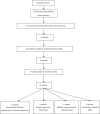Improving reporting of adverse drug reactions: Systematic review
- PMID: 20865089
- PMCID: PMC2943157
- DOI: 10.2147/clep.s4775
Improving reporting of adverse drug reactions: Systematic review
Abstract
Background: Adverse drug reactions (ADRs) are a significant cause of morbidity and mortality, with many being identified post-marketing. Improvement in current ADR reporting, including utility of underused or innovative methods, is crucial to improve patient safety and public health.
Objectives: To evaluate methods to improve ADR reporting via a systematic literature review.
Methods: Data sources were Medline, Embase, Cochrane Library and National Library for health searches on ADR reporting (January 1997 to August 2007) including cross-referenced articles. Twenty-four out of 260 eligible studies were identified and critically assessed. Studies were grouped as follows: i) spontaneous reporting (11); ii) medical chart/note review (2); iii) patient interviews/questionnaires (3); and iv) combination methods including computer-assisted methods (8).
Results: Using computerized monitoring systems (CMS) to generate signals associated with changes in laboratory results with other methods can improve ADR reporting. Educational interventions combined with reminders and/or prescription card reports can improve hospital-based ADR reporting, and showed short to medium term improvement.
Conclusions: The use of electronic health data combined with other methods for ADR reporting can improve efficiency and accuracy for detecting ADRs and can be extended to other health care settings. Although methods with educational intervention appear to be effective, few studies have reviewed long-term effects to assess if the improvements can be sustained.
Keywords: ADR; adverse drug reaction; reporting.
Figures
References
-
- World Health Organization . International drug monitoring: The Role of National Centres Report No: 498. Geneva, Switzerland: World Health Organization; 1972. - PubMed
-
- Lazarou J, Pomeranz BH, Corey PN. Incidence of adverse drug reactions in hospitalized patients: a meta-analysis of prospective studies. JAMA. 1998;279(15):1200–1205. - PubMed
-
- National Confidential Enquiry into Patient Outcome and Death [NCEPOD] For better, for worse? A review of the care of patients who died within 30 days of receiving systemic anti-cancer therapy 2008. Cited February 3, 2009. Available from: http://www.ncepod.org.uk/2008sact.htm
LinkOut - more resources
Full Text Sources
Research Materials


